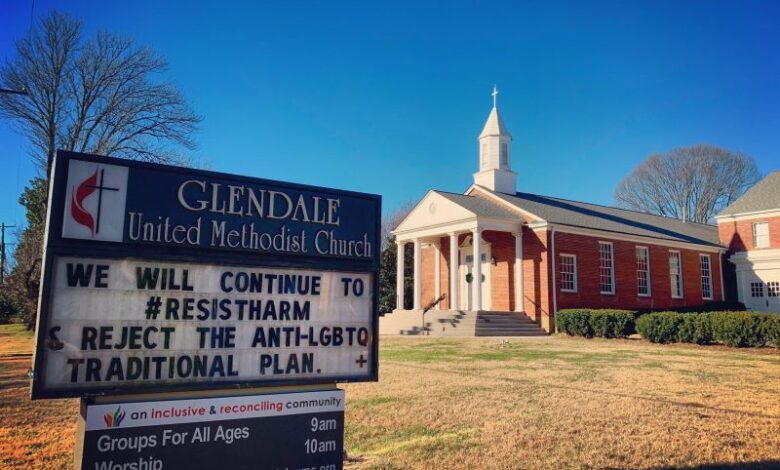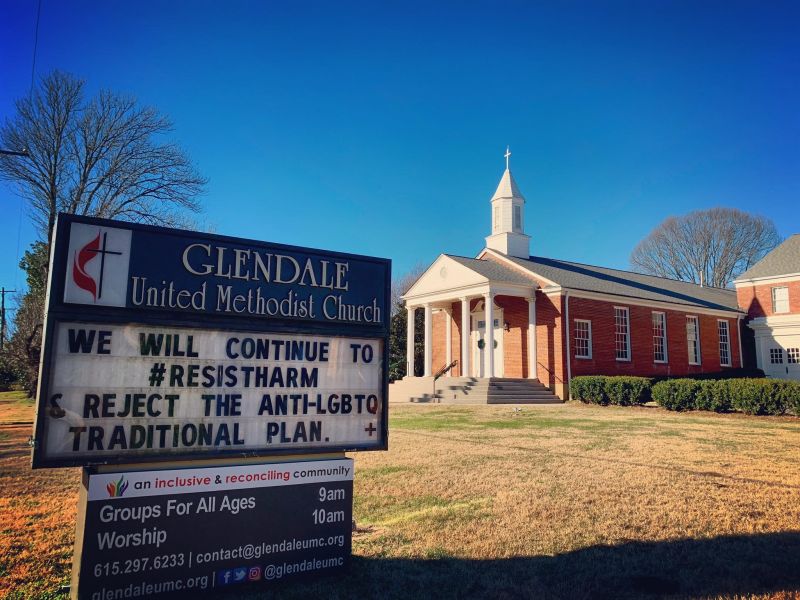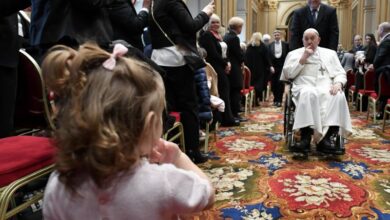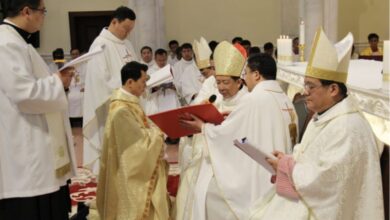Thousands of United Methodist churches break away over LGBTQ+ disagreements

 A pro-LGBTQ message on a Methodist church in Nashville, Tennessee. / Glendale United Methodist Church|Flickr
A pro-LGBTQ message on a Methodist church in Nashville, Tennessee. / Glendale United Methodist Church|Flickr Washington D.C., Jun 6, 2023 / 15:45 pm (CNA).
As the United Methodist Church (UMC) is rocked by disagreement over LGBTQ+ issues, more than 4,000 congregations have officially split from the denomination this year.
More congregations joined the growing schism this weekend with 60 leaving in Michigan on Saturday and 250 in Kentucky splitting with the UMC on Sunday.
Jay Therrell, president of the Wesleyan Covenant Association and a leader in the “disaffiliation” movement, told CNA that “the authority of Scripture and the lordship of Christ” has “deteriorated for many, many years in the United Methodist Church.”
Today, Therrell said, that problem is “playing out in the issue of human sexuality.”
As of Tuesday afternoon, 4,876 Methodist churches this year have officially completed the process to break away from the UMC, Therrell said.
According to Therrell, many of those churches have gone on to join the more theologically conservative Global Methodist Church, which was founded in 2022 with the help of the Wesleyan Covenant Association and now numbers approximately 2,500 congregations.
“We absolutely believe that the United Methodist Church is drifting day by day ever more progressive,” Therrell said. “We have bishops all across the globe who are completely violating the Book of Discipline [the primary Methodist book of teachings, similar to the Catholic catechism]. They are allowing all sorts of things to happen that violate various paragraphs, much of it to do with human sexuality.”
The conflict erupted in full force in 2019 after a special session of the General Conference of the entire UMC debated whether to adopt new rules promoting homosexuality in the church. The propositions were ultimately defeated in a 53% to 46% vote approving a “Traditional Plan” reaffirming the UMC’s stance on traditional marriage and sexuality.
Since 2019, however, the UMC has steered the church toward the left on key social issues such as LGBTQ+ ideology.
Though denying the ordination of homosexual individuals, the UMC’s official website states that “everyone is welcome to worship and actively participate in the life of our churches” and that “laypersons may become members and live out their faith through their local church without respect to sexual orientation or practice.”
The UMC’s website further admits that the denomination’s teaching on homosexuality may be changed in the future. “When the next General Conference convenes (April–May 3, 2024) it will address multiple legislative proposals to alter existing church policies on human sexuality and to divide or restructure the denomination as a result of differences on these and other issues,” the UMC’s website states.
In the United States, the UMC is divided into five “jurisdictions.” Each of these jurisdictions passed similar measures in 2022 stating that “LGBTQIA+ people will be protected, affirmed, and empowered” in the church, according to the AP.
Of the 46 active UMC bishops, two are openly homosexual, despite official UMC policy denying the ordination of LGBTQ+ persons.
Meanwhile, the influence of LGBTQ+ supportive groups has been increasing within the UMC.
The Reconciling Ministries Network (RMN) is a group that, according to its website, is “committed to intersectional justice across and beyond the United Methodist connection” and is “working for the full participation of all LGBTQ+ people throughout the life and leadership of the Church.”
According to a November 2022 RMN statement, conferences of the UMC’s five jurisdictions resulted in “a historic slate of episcopal elections for the Reconciling movement” in which 13 new LGBTQ+ supportive bishops were elected.
“Episcopal elections are important for LGBTQ+ justice because our Church’s moral direction is deeply influenced by the values of the elected bishops and because bishops hold immense power to affect the livelihoods of LGBTQ+ clergy and congregations seeking justice and inclusion,” RMN said. “We celebrate these newly elected justice-seeking bishops who represent more of the whole of humanity and whose wisdom is invaluable in the ongoing co-creation of our Church.”
Besides electing openly homosexual bishops, some members of the UMC clergy have called for official apologies to be made for even challenging their election.
At the 2022 South Central Jurisdiction Conference, RMN reported that Rev. Katie McKay Simpson, a pastor from Louisiana, “called the jurisdiction to collective confession and apology for challenging the historic election of Bishop Karen Oliveto, the Church’s first out gay bishop.”
To Therrell, the jurisdictions’ adoption of pro-LGBTQ+ resolutions “telegraph where the future of the UMC is.”
“We think it is highly likely at the General Conference in 2024 that the definition of marriage will change, that the ordination standards will change, and that most of the traditional provisions we’ve passed in recent years will be repealed,” Therrell said.
As of now, nearly one-quarter of UMC congregations have officially broken away within the last five years.
The departures have only been increasing exponentially. According to UM News, the official news-gathering agency of the UMC, 4,645 churches officially split from the UMC so far this year. That is more than double the number of churches that left in the previous year (2,003) and almost 10 times the number in 2021 (486).






